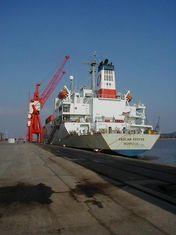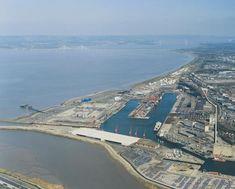


located on 2,600 acres at the Avonmouth and Portbury docks, the Bristol Port Company (BPC) is again trading in fresh produce. It has been 25 years since Bristol was a large port for fruit, trading back then with the empire and commonwealth.
As trade became difficult for many UK ports in the 1980s, Bristol port began to struggle commercially and trade was lost through poor labour relations, strikes and lack of capital investment. However, in 1991, First Corporate Shipping Limited, owned by Terence Mourdaunt and David Ord, took over the west-coast port from Bristol City Council, resulting in some major changes under the new owners: throughput has increased from four million tonnes to 12mt and revenue from £21.6m to £67m. Over the years there has also been £312m invested in capital that has attracted new businesses and brought back traditional business to the port. A 650-person workforce is now employed by BPC and the company underwent a complete change in work attitudes and culture.
In January 2003, a multi-million pound, state-of-the-art fresh produce terminal (FPT) was opened, made up of an 8,500-pallet store with nine individually temperature-controlled chambers and eight dispatch bays. On arrival of a fresh produce shipment, the palletised fruit cargo is moved directly from the ship to a temperature-controlled reception area, the produce is scanned in the chill store and itemised into a computer system. This system, developed with the receivers and supermarkets in mind, uses radio data terminals and real-time graphical displays, enabling every pallet to be tracked for location and status until redelivery. Unlike many ports, BPC employs its own labour force and trains it to work in the FPT environment, which requires specialist skills to work with time-sensitive produce, operate machinery and computer system knowledge. Twenty chill store workers, identifiable by their green overalls, are backed up by contract labour during busy periods to guarantee that ships are turned around quickly.
So why did current management decide to re-introduce fresh produce as a bulk cargo to Bristol after decades of absence? Current ceo Simon Bird says it’s simple; market forces create demand for points of entry in the UK, not shipping. Bird explains there are a number of reasons: the port is geographically well-located and can service a vast majority of the UK’s population by road or rail; and commerce that has been developed, such as coal and cars, came about from demand. “Trade is developed by demand and our trades are driven by people,” says Bird. “Bristol port is within reasonable distances from 36 major supermarket regional distribution centres (rdc), and in the Bristol region alone there are six. From port to rdc, we offer a lower cost alternative than other main ports and this is a major reason we see the economies working.”
When evaluating the plans for the FPT, management closely examined the cost of moving produce to the supermarket, and learnt that 100 per cent of trade does not go directly to rdcs. They thought that by providing product scanning services and quality control checks at the FPT, produce could be transported by road or rail directly to supermarkets. “There are already large volumes of fresh produce moving from Iberia and the southern hemisphere to the UK,” continues Bird. “We talked to several supermarkets and key receivers, such as Empire World Trade (EWT) for their input, who thought that heavy congestion existed in the major ports and that there was a lack of capacity. We spent 18 months researching and assessing which trade was not locked into a port and was re-routable - fresh produce came up.”
EWT was involved with the terminal development from the start and was consulted on several matters - operations director Trevor Hyde advised BPC in terms of the practicalities with racking and warehousing. “The systems that work well at EWT were implemented at Bristol, such as product despatch and stock control procedures,” explains trading manager David Alliston. “Currently, EWT brings 20,000 pallets through the port annually for all mainstream apple and pear varieties. We use the port daily from March to October, distributing the produce nationally by road.” Alliston says that one advantage of the port is that it “offers an excellent distribution location, particularly its close proximity to major motorways, but avoiding the M25. The south-east is a densely populated area. Road usage and congestion is far less of an issue around the west of the UK and Bristol offers closer proximity to our customers’ depots”.
BPC management realised they had the shipping companies, the available routes and the demand from the receivers, so the next challenge was implementation. Bird says: “We had a good look at the industry, in particular at New Zealand, Chile and South Africa. Over the past four years, we have had a weekly South African container service come to the port with cars. And for two years now, the cargo has also included chilled traffic on that line.
“We then looked at the New Zealand season, which runs from April to July, and Chile - grapes and apples are sent to the UK between December and July.” This year the port trialed a joint-managed service from Chile that worked well, and good volumes were shipped at a lower cost per mileage from port to receivers/supermarkets. “This service will continue next season and we realise there is more work we can do with volumes to further improve the costs savings,” says Bird. The company also handles the New Zealand STAR service although this month already sees the arival of seven ships carrying containers above and below deck.
The ceo continues: “The outlook is extremely positive. Our aim was to maintain the cool-chain and - as the new players - we needed to offer something different; so we guaranteed berthing and labour on arrival and now have the highest-spec chill store in the UK.” The port operates every day (except for a day and a half), around the clock. Shipments typically comprise 2,000 pallets below decks and 20-60 containers on deck and are predominantly fruit - apples, grapes, pears, nectarines, kiwis and onions. During the peak season, the FPT ran at 85 per cent, and the company plans to expand into phase two, building 5,000 extra pallet spaces for next year. “The facility is only two-thirds developed and we can go into the final third in very quick-time - in 12 weeks we can increase the capacity to accommodate another 5,000 pallets and we want this to be on stream for the start of the next season.” Bird is confident that the increased capacity will be taken up. “Before Christmas, there was high demand for Bristol port services and we discharged four big ‘great whites’ over four weekends. The cargo was customs cleared the same day, which is usually a problem at ports, and the goods were delivered to supermarkets that day, with the remainder stored in the FPT. We are a very market driven company and very efficient - industries notice that.”
BPC prides itself on the level of organisation and the detail transposed to all its trades. “We want to maintain the high ship-turnover and increase our market share by taking an extra 20-25 per cent of the market share”, says the ceo.
Plans for the future are already in the pipeline. “There are approximately 100,000 truck movements from Spain to UK supermarkets a year for produce such as citrus and tomatoes,” explains Bird. “Road costs are usually low but over Christmas this can increase by five times. BPC saw an opportunity to develop the Bilbao to Bristol route, which is the shortest distance between Iberia and the UK and already has four sailings a week.
“We did a lot of work with the top six UK growers with facilities in Spain, involved the category managers and have already run trials to demonstrate that shipping is a fast alternative to truck movement and provides them with potential cost-savings.” For the trial runs, BPC bought a 45 foot pallet-wide container in order to transport the same volumes coming by road. The trial was run on iceberg lettuce and the results showed that the transport time by ship did not affect the quality of the lettuce delivered, with the added advantage of no threat of temperature variations.
“We see Spain as a big opportunity. We plan to run further trials over summer with the view to establish a daily shipping line by the end of the year. This will require a big investment from us - we will need ships that accommodate 45ft pallet-wide containers, and we are prepared to buy 50 containers ourselves at a cost of £1.5 million. We realise to compete we need to match the three and a half day road delivery, as well as guarantee reliability year round and offer flat shipping rates throughout the year,” says Bird.
And the plans don’t stop there - BPC management are thinking about the introduction of a dedicated banana-ripening centre at the port, “which is quickly and easily done,” says Bird. “This makes sense as most ripening centres are located in the middle of the country. The banana trade is year-round, unlike apples and other fruit.”
So far, BPC’s efforts seemed to have paid off and EWT’s Alliston sums things up: “BPC has a professional, forward-thinking approach to serving major multiples as efficiently as possible. It was a good opportunity to have systems tailored to meet our requirements and specifications, and we were given total input into these decisions. For the future, we would like to see increased capacity and more shipping services.” They may soon get what they want if the BPC continue to sail on smooth seas.
Port kicks up storm
l There is a dedicated orange juice storage terminal for Brazilian company Curtale. The newly built European Juice Terminal received its first shipment at the end of 2002, which consisted of 8,000t of orange juice concentrate, pumped from the ship to the storage terminal by pipeline and is redistributed by road to the juice packers.
From July 1 it will be mandatory under Transec for all major ports to be assessed for security and to establish secured areas. BPC has eight months to become compliant, which includes fresh produce trade.
The lock at the port is 42.7m in beam and ships with deadweight of 120,000t can be accommodated.
To distinguish the port 2,600 acre site, all fixtures are marked up in red, from bollards to lamposts and the old silos on the Avonmouth docks are currently being redeveloped.






No comments yet